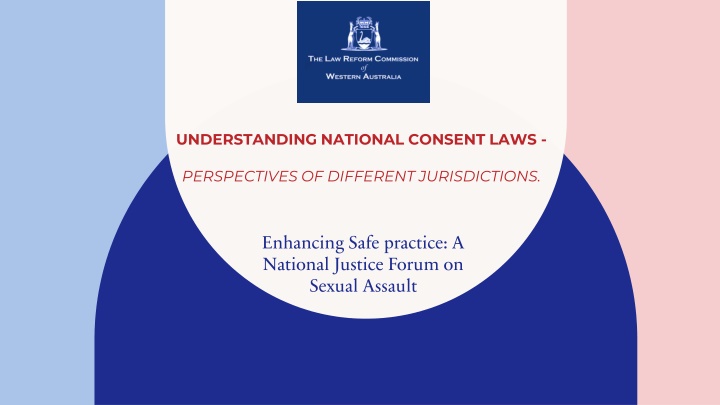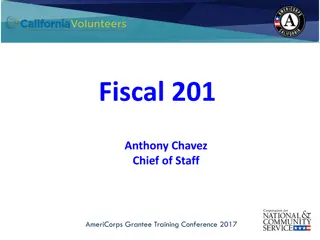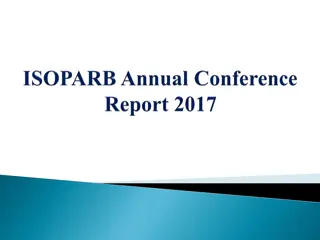
National Consent Laws and Perspectives on Safe Practice
Explore the insights into national consent laws, with a focus on diverse jurisdictions and the implementation of affirmative models of consent. Delve into the review of Western Australia's sexual offences and considerations around the accused's belief in consent.
Download Presentation

Please find below an Image/Link to download the presentation.
The content on the website is provided AS IS for your information and personal use only. It may not be sold, licensed, or shared on other websites without obtaining consent from the author. If you encounter any issues during the download, it is possible that the publisher has removed the file from their server.
You are allowed to download the files provided on this website for personal or commercial use, subject to the condition that they are used lawfully. All files are the property of their respective owners.
The content on the website is provided AS IS for your information and personal use only. It may not be sold, licensed, or shared on other websites without obtaining consent from the author.
E N D
Presentation Transcript
UNDERSTANDING NATIONAL CONSENT LAWS - PERSPECTIVES OF DIFFERENT JURISDICTIONS. Enhancing Safe practice: A National Justice Forum on Sexual Assault
PROJECT 113 PROJECT 113 REVIEW OF WESTERN REVIEW OF WESTERN AUSTRALIA S SEXUAL OFFENCES AUSTRALIA S SEXUAL OFFENCES 2 In 2023 the Law Reform Commission of Western Australia completed a review of Western Australia s sexual offences. The Commission made 134 recommendations, including that: Western Australia s sexual offences be based on a model of affirmative consent; That various jury directions applicable by jurors when considering consent ought to be legislated. The Western Australian Government said that it: provides its in-principle support to modernisingWestern Australia s laws on sexual offences and legislating an affirmative consent model to better reflect community standards, support victim survivors and deliver just outcomes. However, no Bill has been introduced to amend WA s sexual offence laws.
THE AFFIRMATIVE MODEL OF CONSENT THE AFFIRMATIVE MODEL OF CONSENT 3 Affirmative model of consent A model of consent where participants not only communicate consent to each other, but also actively seek the consent of the other participant to a sexual activity. The model of consent should underly both the definition of consent and operation of the mental state element/ mistaken belief in consent defence.
Presentation title 4 THE ACCUSED S BELIEF IN CONSENT THE ACCUSED S BELIEF IN CONSENT Australian jurisdictions can be divided into two broad categories: Jursidictions in which sexual offences contain a mental state element (ACT, NSW, NT, SA, Vic). For example, in NSW the offence of sexual assault requires proof that (i) the accused had sexual intercourse with the complainant; (ii) the complainant did not consent; and (iii) the accused knew that the complainant was not consenting. If the accused lacked such knowledge, they must not be convicted of the offence, even if the sexual intercourse was non-consensual. Jurisdictions in which sexual offences do not contain a mental state element (Qld, Tas, WA). For example, in Western Australia the offence of sexual penetration without consent only requires proof that (i) the accused sexually penetrated the complainant; and (ii) the complainant did not consent to that conduct.
5 For example, in Western Australia section 24 of the Criminal Code provides that: Presentation title THE ACCUSED S THE ACCUSED S A person who does or omits to do an act under an honest and reasonable, but mistaken, belief in the existence of any state of things is not criminally responsible for the act or omission to any greater extent than if the real state of things had been such as he believed to exist. BELIEF IN CONSENT BELIEF IN CONSENT In each of the jurisdictions where the sexual offences do not contain a mental state element, the accused s mental state is relevant to the mistake of fact defence. The operation of this rule may be excluded by the express or implied provisions of the law relating to the subject. (Tas) ss 14-14A. Criminal Code Act Compilation Act1913 (WA) s 24; Criminal Code Act1899 (Qld) s 24; Criminal Code Act1924
Presentation title 6 THE ACCUSED S BELIEF IN CONSENT THE ACCUSED S BELIEF IN CONSENT DIFFERENCES BETWEEN THE MISTAKEN BELIEF DEFENCE IN NON DIFFERENCES BETWEEN THE MISTAKEN BELIEF DEFENCE IN NON- -MENTAL ST JURISDICTIONS JURISDICTIONS JURISDICTION JURISDICTION THE MENTAL STATE/S THAT THE PROSECUTION MUST PROVE THE MENTAL STATE/S THAT THE PROSECUTION MUST PROVE QLD (current) & WA consenting. QLD (new) Current mistaken belief defence, plus, a mistaken belief is not reasonable if the accused did not, immediately before or at the time of the act, say or do anything to ascertain whether the complainant consented. LRCWA recommend n accused did not, within a reasonable time before or at the time of the act, say or do anything to find out whether the complainant consented. TAS If there is evidence to raise the issue, the prosecution must prove that the accused did not have an honest and reasonable, but mistaken, belief that the complainant was consenting. A mistaken belief is not honest or reasonable if the accused was reckless as to whether or not the complainant consented; or did not take reasonable steps, in the circumstances known to them, to ascertain that the complainant was consenting to the act. MENTAL STATE ATE If there is evidence to raise the issue, the prosecution must prove that the accused did not have an honest and reasonable, but mistaken, belief that the complainant was Current mistaken belief defence, plus, a mistaken belief is not reasonable if the
Presentation title 7 THE ACCUSED S THE ACCUSED S For example, section 61HK(1) of the Crimes Act 1900 (NSW) states that: The accused person is taken to know that another person does not consent to a sexual activity if (a) the accused person actually knows the other person does not consent to the sexual activity; or (b) the accused person is reckless as to whether the other person consents to the sexual activity; or (c) any belief that the accused person has, or may have, that the other person consents to the sexual activity is not reasonable in the circumstances. BELIEF IN CONSENT BELIEF IN CONSENT In each of the jurisdictions where the sexual offences contain a mental state element, the prosecution does not have to prove that the accused had actual knowledge that the complainant was not consenting.
Presentation title 8 THE ACCUSED S BELIEF IN CONSENT THE ACCUSED S BELIEF IN CONSENT DIFFERENCES BETWEEN MENTAL STATE JURISDICTIONS DIFFERENCES BETWEEN MENTAL STATE JURISDICTIONS JURISDICTION JURISDICTION THE MENTAL STATE/S THAT THE PROSECUTION MUST PROVE THE MENTAL STATE/S THAT THE PROSECUTION MUST PROVE ACT & NSW Actual knowledge that the complainant was not consenting, recklessness or a belief that the complainant consented which was not reasonable in the circumstances. A belief is not reasonable in the circumstances if the accused did not, within a reasonable time before or at the time of the sexual activity, say or do anything to find out whether the complainant consented. NT Recklessness (including not giving any thought to whether or not the complainant was consenting). SA Knowledge that, or reckless indifference to whether, the complainant consented (inc not giving any thought to whether or not the complainant was consenting) VIC The accused did not reasonably believe that the complainant consented. A belief is not reasonable if the accused did not, within a reasonable time before or at the time the act takes place, say or do anything to find out whether the complainant consented.
Presentation title 9 THE ACCUSED S BELIEF IN CONSENT THE ACCUSED S BELIEF IN CONSENT The differences in approach to an accused s belief in consent may or may not result in different verdicts in Australian jurisdictions for complaints of the same sexual acts. There is no uniformity in Australia s sexual offences because of these differences in approaches. No jurisdiction has stated an intention to change its laws for the sake of harmonisation.
JURY DIRECTIONS JURY DIRECTIONS DO JURORS NEED MORE HELP DO JURORS NEED MORE HELP TO UNDERSTAND CONSENT AND EVALUATE TO UNDERSTAND CONSENT AND EVALUATE EVIDENCE RELATING TO CONSENT? EVIDENCE RELATING TO CONSENT? 10 sexual violence is one that is commonly misunderstood by people without training or education in the area. Research has revealed that widely held assumptions about how frequently sexual violence occurs, and when, where and against whom it occurs, are usually incorrect and do not reflect the reality of sexual violence The problem is not necessarily individual juror prejudice and sexist views; rather, it is the idea that common sense and experience can be applied to the facts of a specific form of criminal offending which, because of its distinctive features, is at risk of illegitimate reasoning and incorrect decision making when handled by people who have no prior experience in the area. - Law Commission (NZ) The Justice Response to Victims of Sexual Violence: Criminal Trials and Alternative Processes, 2015
VICTORIA VICTORIA JURY DIRECTIONS ON CONSENT JURY DIRECTIONS ON CONSENT Counsel must request the directions they want given Judge must give requested directions unless good reasons for not doing so Judge must not give a direction not requested unless substantial and compelling reasons for doing so Sexual offence directions that relate directly to proof of lack of consent or to the jury s evaluation the evidence relating to consent: Consent inc. that: factual scenarios in which people do not consent vary widely; consent may be withdrawn; lack of consent does not require physical injury/violence/threats; responses to non-consensual sexual acts vary; person may have consented to other /previous sexual acts The accused s belief in consent Delay and credibility Inconsistency in complainant s account Continuation of relationship/communication after alleged offending Distress / lack of distress when giving evidence 11
NSW NSW JURY DIRECTIONS ON CONSENT JURY DIRECTIONS ON CONSENT Judge must give requested directions if there are good reasons to do so Sexual offence directions that relate directly or indirectly to proof of lack of consent: Consent inc. that: circumstances in which non-consensual sexual activity occurs, responses to non-consensual sexual activity, lack of consent does not require physical injury/violence/threats; behaviour and appearance of complainant, Delay in complaint and credibility Inconsistency in complainant s account Distress / lack of distress when giving evidence 12
Presentation title 13 JURY DIRECTIONS ON CONSENT JURY DIRECTIONS ON CONSENT Detailed legislated jury directions about consent and the evaluation of evidence relevant to consent are comparatively new to Australia. Not all Australian jursidictions have edtailed legislated jury directions about consent and the evaluation of evidence relevant to consent . There is variable support for them and some resistance from judicial officers to them especially if the legislation directs when and how they are to be given in a trial. Nevertheless, given that there is not the same historical attachments to them and to forms of them, they may be an area of law where harmonisation or uniformity between Australian jurisdictions may be achieved.



















